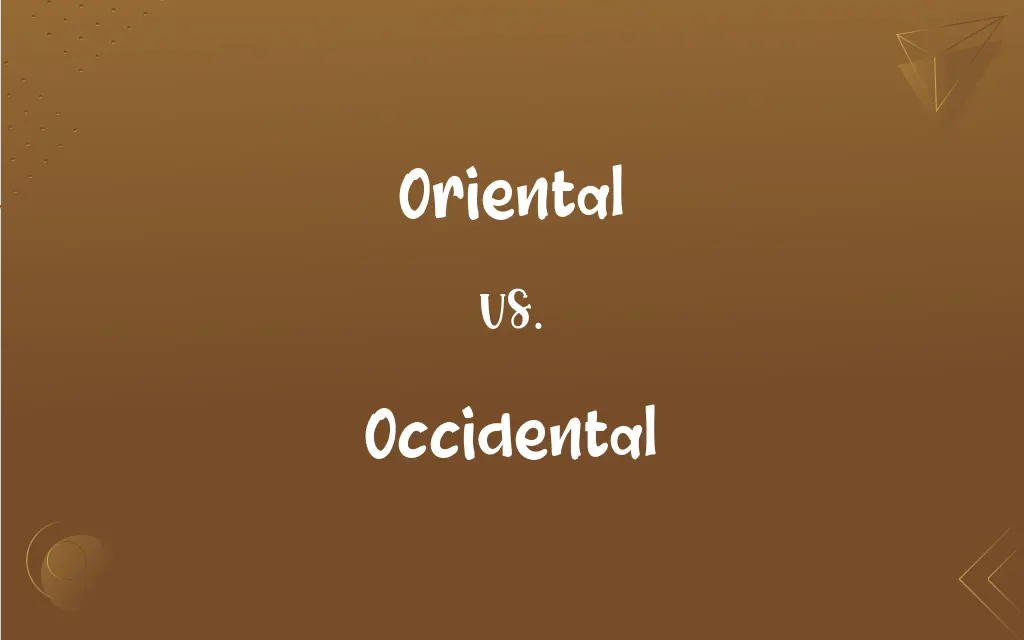Oriental vs. Occidental: What's the Difference?
By Janet White || Updated on March 3, 2024
Oriental refers to Eastern regions, while Occidental pertains to the West.

Key Differences
Oriental is a term historically used to describe regions, cultures, and peoples of Asia, especially East Asia, embodying characteristics perceived as Eastern. Whereas Occidental refers to the countries, cultures, and aspects of the Western world, typically including Europe and the Americas, representing Western characteristics and traditions.
The use of Oriental has declined in contemporary discourse due to its colonial connotations and generalizations about Asian cultures. On the other hand, Occidental remains a less contentious term but is also used less frequently, replaced by more specific regional descriptions.
In academic and historical contexts, Oriental studies once encompassed the study of languages, cultures, and histories of Asian countries. Conversely, Occidental studies focused on Western philosophies, literature, and cultural studies, reflecting a Eurocentric perspective.
The division between Oriental and Occidental has been criticized for oversimplifying and dichotomizing the complex tapestry of global cultures. While the terms might still be used in certain scholarly or artistic contexts, there is a growing preference for more precise and respectful language.
Despite their historical significance, the terms Oriental and Occidental are increasingly viewed as relics of a bygone era, with a shift towards terminology that respects the diversity and autonomy of cultures without resorting to broad generalizations.
ADVERTISEMENT
Comparison Chart
Geographic Focus
Asia, especially East Asia
Europe and the Americas
Contemporary Use
Declined due to sensitivities
Less contentious but less used
Academic Fields
Oriental studies
Western philosophies and cultural studies
Connotations
Colonial, generalized
Eurocentric, less generalized
Alternatives
Asian, specific regional names
Western, specific regional names
ADVERTISEMENT
Oriental and Occidental Definitions
Oriental
Decline in Use.
The term Oriental is now often avoided due to its colonial implications.
Occidental
Cultural Studies.
Her research in Occidental studies explores the Renaissance period in Europe.
Oriental
Historical Usage.
Oriental art has influenced various artistic movements in the West.
Occidental
Of or relating to the countries of the Occident or their peoples or cultures; western.
Oriental
Academic Context.
He specialized in Oriental studies, focusing on Middle Eastern languages.
Occidental
A native or inhabitant of an Occidental country; a westerner.
Oriental
Artistic Influence.
The Oriental aesthetic has been a source of inspiration for many Western artists.
Occidental
Of, pertaining to, or situated in, the occident, or west; western.
Occidental climates, or customs; an occidental planet.
Oriental
Often Oriental Of or relating to the countries of the Orient or their peoples or cultures; eastern.
Occidental
Of a gem or precious stone: of inferior value or quality.
Oriental
Oriental(Biology) Of or designating the biogeographic region that includes South Asia south of the Himalaya Mountains and Southeast Asia from southern China to Borneo.
Occidental
A Western Christian of the Latin rite
Oriental
Of or relating to the Oriental Orthodox Church.
Occidental
Of, pertaining to, or situated in, the occident, or west; western; - opposed to oriental; as, occidental climates, or customs; an occidental planet.
Oriental
Lustrous and valuable
Oriental pearls.
Occidental
Possessing inferior hardness, brilliancy, or beauty; - used of inferior precious stones and gems, because those found in the Orient are generally superior.
Oriental
Of or relating to a genuine or superior gem
An oriental ruby.
Occidental
A native inhabitant of the Occident
Oriental
Relating to or designating corundum that resembles another stone in color.
Occidental
An artificial language
Oriental
Often Offensive An Asian, especially a South Asian, Southeast Asian, or East Asian.
Occidental
Denoting or characteristic of countries of Europe and the Western Hemisphere;
Occidental civilization
Hesperian culture
Oriental
A domestic cat of a breed developed in Britain from the Siamese and other breeds, having a long slender body and either a long or short coat in a wide variety of colors and patterns.
Occidental
Western World.
Occidental philosophies have shaped much of modern Western thought.
Oriental
Alternative case form of Oriental
Occidental
Less Contentious.
Occidental is used to denote Western regions without the same sensitivities as Oriental.
Oriental
Alternative case form of Oriental
Occidental
Usage.
Occidental cultures are often characterized by their historical emphasis on democracy and rationalism.
Oriental
Of or pertaining to the orient or east; eastern; concerned with the East or Orientalism; - opposed to occidental; as, Oriental countries.
The sun's ascendant and oriental radiations.
Occidental
Modern Alternatives.
The term Western is now more commonly used instead of Occidental.
Oriental
A native or inhabitant of the Orient or some Eastern part of the world; an Asiatic.
Oriental
Eastern Christians of the Greek rite.
Oriental
A member of an Oriental race
Oriental
Denoting or characteristic of the biogeographic region including southern Asia and the Malay Archipelago as far as the Philippines and Borneo and Java;
Oriental politeness
For people of South and East Asian ancestry the term `Asian' is preferred to `Oriental'
Asian ancestry
Oriental
Geographic Focus.
The Oriental region is renowned for its diverse cultures and ancient civilizations.
FAQs
How do these terms reflect historical perspectives?
They reflect a Eurocentric world view that divided the world into Eastern and Western spheres.
What does Occidental specifically refer to?
Occidental refers to the cultures, regions, and countries of the Western world, primarily Europe and the Americas.
Is Occidental ever considered offensive?
Occidental is less likely to be considered offensive but is also used less frequently in favor of more specific terms.
Why is the term Oriental considered outdated or offensive?
Oriental is seen as outdated due to its colonial roots and overgeneralization of diverse Asian cultures.
Is there a difference in the application of these terms across languages?
Yes, the connotations and usage of these terms can vary significantly in different languages and cultural contexts.
Were Oriental and Occidental ever used in geopolitical contexts?
Yes, these terms were historically used in geopolitical discourse, but this usage has largely been replaced by more specific geopolitical terms.
Are there more appropriate terms to use instead of Oriental and Occidental?
Yes, it's better to use specific regional names like Asian, European, or Western to avoid generalizations.
How do modern globalization and multiculturalism impact the use of these terms?
As cultures become more interconnected, there's a greater emphasis on specificity and respect in cultural references, reducing the use of broad terms.
How do these terms influence cultural perceptions?
They can reinforce outdated stereotypes and simplistic divisions between cultures.
Can these terms still be found in academic contexts?
While their use has declined, they may still appear in historical or specific scholarly discussions.
What are the alternatives to Oriental studies in academia?
Fields such as Asian studies or specific regional studies (e.g., Middle Eastern studies) are preferred.
Can the use of these terms impact international relations?
Language reflects and can influence attitudes, so careful terminology can foster more respectful international relations.
Can these terms be found in historical maps or texts?
Yes, they often appear in older documents, reflecting the historical period's linguistic norms.
How do these terms relate to concepts of identity and belonging?
They can influence how individuals perceive their own and others' cultural identities, but there's a growing preference for self-identification based on specific cultural, national, or regional affiliations.
How has the internet influenced the use and perception of these terms?
The internet, fostering global communication, has played a role in highlighting the need for more precise and culturally sensitive language.
Are there movements to reclaim or redefine these terms?
While there are efforts to recontextualize historical terms, the focus is generally on promoting more accurate and respectful language.
How do Oriental and Occidental concepts affect art and literature?
These concepts have historically influenced artistic and literary themes, though there's a move towards more nuanced representations.
How do educational institutions address the use of these terms today?
Many institutions have updated curricula to use more specific and respectful terminology, reflecting contemporary sensibilities.
Do these terms appear in legal or policy documents?
Their appearance in modern legal or policy documents is rare and typically only in historical contexts.
Are there any industries where these terms are still commonly used?
Their use has declined across most industries, with a preference for more specific and culturally sensitive terminology.
About Author
Written by
Janet WhiteJanet White has been an esteemed writer and blogger for Difference Wiki. Holding a Master's degree in Science and Medical Journalism from the prestigious Boston University, she has consistently demonstrated her expertise and passion for her field. When she's not immersed in her work, Janet relishes her time exercising, delving into a good book, and cherishing moments with friends and family.































































